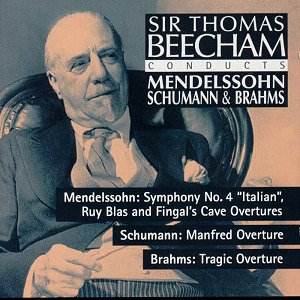This is another eminently well selected release
from the impressive uniform-liveried Sony Beecham series. It collates
works by three composers, two of whom were acknowledged specialities
of Beecham’s and the other, Brahms, of which he was a fitfully
enlightening interpreter. Most of the repertoire plays very much
to his strengths of lyricism, elegance and a grandeur generated
through consistently elevated phrasing.
Thus Ruy Blas is suffused with lyric elegance
with all sections of the orchestra immaculately drilled – brass
effulgent, flute lines deliciously traced – and a sense of buoyancy
quite without breathlessness. The Hebrides receives an attractive
rather than outstanding interpretation. It’s strong on atmosphere
and mines a particularly withdrawn introspection; dynamics are
scrupulously reduced and there’s an elastic sensitivity to much
of the phrasing without any great voluptuous upheaval and drama.
The Italian Symphony is beautifully done. There’s a deliciously
sprung rhythm to the opening movement, which is not rushed off
its feet as it all too often was then (see Toscanini, Monteux,
Cantelli et al). The tempo is relaxed but with sufficient dynamism
and internal rhythm to draw it on and Beecham cultivates a real
degree of clarity without indulging any sense of specious excitement.
The way he leads into the fugal development section with captivating
lightness of touch is a delight. He doesn’t take the first movement
repeat in common with most performances of the day – though Klemperer
was unusual inasmuch as he did take it, to advantage, in his almost
contemporaneous recording. The Andante con moto is, once more,
taken at a refreshing tempo with the string lines delightfully
moulded, the crest and melodic fall artfully shaped, whilst the
third movement has a charming lyricism in Beecham’s hands. He’s
clearly keen to distinguish between the movements in terms of
tempo and accenting and to this extent this movement is definitely
con molto moderato - that means that it’s quite measured but has
time to articulate and breathe. The Saltarello finale is not as
sheerly vibrant and exciting as others’ performances. Its slightly
weighted measure brings with it other rewards, however, such as
those of balance and apposite colour and rhythm – and this is
altogether a most convincing and affectionate performance.
Beecham harboured a degree of reverence for Schumann,
adding that all that is best in the German soul is enshrined
here. He’d first conducted parts of Manfred, a work about
which he nevertheless had mixed feelings, in 1918 though in a
fairly free staging which he had done his inimitable best to "cheer
up." This included interpolations of orchestrated piano pieces
and other tomfoolery calculated to banish the "tedium"
Beecham found in the score. The much later 1954 recording of a
large part of the score was available on CD (on Lady Beecham’s
Beecham4) but this Overture recording dates from two years later.
It wasn’t a piece he performed in the concert hall – only one
performance has been traced, from 1949 – but you’d never know
it from this gravely surging, complexly emotive and sensitively
textured performance. Overarching everything is an elevated nobility
of spirit that must in all its philosophic and literary allusiveness
have greatly appealed to Beecham, surely one of the most bookish
of all leading conductors. We end with Brahms’s Tragic Overture.
It’s tautly conceived in terms of transitions, quite light in
texture, with a lyrically controlled central section. It doesn’t
seem to me to extrapolate any great depth from the score, though,
and whilst the climax is well judged it rather lacks the sense
of determined tension that authentic Brahmsians bring to the overtures.
The notes, excellent as ever, are by Graham Melville-Mason
and the remastering is unobtrusive in its excellence. Strongly
recommended then, especially for the Italian Symphony,
Ruy Blas and the Manfred Overture.
Jonathan Woolf
